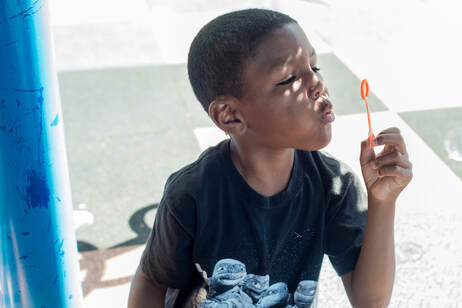|
Early childhood educators and providers looking for guidance on supporting better outcomes for young boys of color have a new resource. “10 Promising Practices in Early Learning for Black Boys: Action Toolkit” is a practical guide for how to address institutional racism that impacts young Black boys and create equitable learning environments that serve the needs of all children. Published by the Boys of Color workgroup, the Toolkit expands on key strategies for improving educational equity that were featured in the workshop “Improving Early Learning Outcomes for Boys of Color: 10 Promising Practices.”  Photo courtesy of Alameda County Fathers Corps Photo courtesy of Alameda County Fathers Corps Developing trusting relationships with Black boys and their families is the foundational building block for implementing the Promising Practices. From the start, the Toolkit identifies trust as a necessary first step that is rooted in listening to families and learning from them, and then provides suggested actions for cultivating such relationships between early learning educators and families, as well as examples of messages to reinforce these relationships. The rest of the Toolkit includes action steps and how-to examples for each of the 10 Promising Practices, which are divided into four types: Culturally Responsive and Sustaining Practice. These practices address approaches for teaching and instruction that center the cultural assets and lived experiences of young boys of color and their families. Action steps include setting aside time to get to know Black boys as individuals, making sure Black boy see themselves reflected in the curriculum, and finding ways to make respectful connections between lessons and Black boys’ lives. Family Engagement. These practices elevate the value of authentic, reciprocal partnership with Black boys’ families and fathers, and highlight the need to leverage community resources to support these relationships. Some action steps include adopting father-friendly principles to ensure Black fathers feel welcomed and valued; dispelling deficit language about Black boys’ abilities; and finding ways to forge productive partnerships to bring in resources. Teacher Anti-Racism and Racial Justice. Two of these three practices deal with educator knowledge of institutional racism, self-awareness and reflection on personal beliefs, and unconscious bias. The third asserts educators’ responsibility to take action to interrupt bias in classrooms and confront racism directly with peers who cause harm to children. Action steps include educators building a personal library of anti-racism books; attending trainings on equity, racism, privilege and power; learning about racial identity development; monitoring their own media consumption; and making the effort to examine and unlearn their own biases. Systems Equity Capacity. These three practices are grounded in assessing school, district and program capacity to provide equitable early childhood education and then taking action to address findings through systems change. Actions include creating space for young Black boys’ voices to be heard; including equity measures in program and personal evaluations; providing professional development on equity and racial justice; and reframing approaches around student behaviors to integrate trauma-informed language and empathy. The Boys of Color workgroup created the Toolkit in response to feedback from participants who attended last year’s 10 Promising Practices workshop and asked for more guidance on using the practices in early learning classrooms and programs. Education content experts Drs. Tasha Henneman, Thomas Williams, and Julie Nicholson developed the Toolkit by drawing from research and best practices in early learning. A panel of Black male educators and practitioners also contributed to the creation of the Toolkit. We welcome your feedback and implementation stories. Please use this link to ask questions or share your stories with us. Comments are closed.
|
Archives
July 2024
Categories
All
|

 RSS Feed
RSS Feed